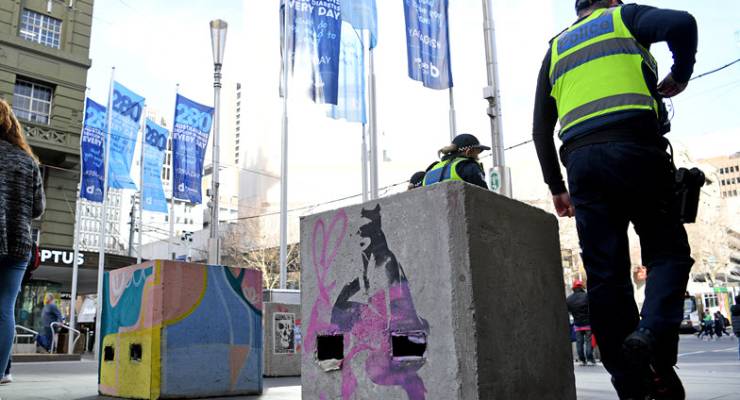
The head of the Productivity Commission has accused policymakers of “reaching for the industry assistance jar at the first sniff of cannon fire in President Trump’s trade war”, as the Commission adds national security spending in its annual hitlist of policy failures.
In a little-reported speech on Tuesday, ahead of today’s release of the Commission’s annual Trade and Assistance Review, chairman Peter Harris, who finishes his term later this year, renewed his criticism of the protectionist strain in Australia’s politicians. Trump’s steel and aluminium tariffs, Harris noted, meant
Politicians on both sides, along with steel company executives, competed to sound alarms and promote the concept of even bigger price imposts on steel users in this country, all in the name of supposedly saving jobs. Knowing that this is how global protectionism breaks out did not stop talk from the Government, of a willingness to consider further ramping up anti-dumping assistance, for the third time this decade, [and from] the Opposition, a preparedness to remove from the Productivity Commission the role of reviewing safeguards tariff increases.
As Harris explained, safeguards tariffs — allowed under international trade rules — are rarely-used “shock absorbers”, which currently can only be used after the PC has carried out an independent review of the case for them. In March, Labor’s Jason Clare promised to strip the PC of that review role and hand it to the protectionist Anti-Dumping Commission.
Harris also took aim at bilateral trade agreements, of which the PC has a long history of scepticism. Bilateral agreements “are generally pretty poor public policy”, he said, knowing full well the Turnbull government routinely touts such agreements as triumphs of economic policymaking. The greatest economic benefits in trade policy, Harris reaffirmed, came from unilateral tariff cuts, as Australia had done in the 1980s and 1990s.
Echoing concerns previously raised in Commission reports, Harris believes that the rules of origin that inevitably accompany trade agreements (what is an Australian product for the purposes of the China-Australia FTA, for example) have become a new form of non-tariff barrier” that destroy any value from such agreements. The “noodle bowl” of rules, he urged, must be shrunk, not increased with ever more FTAs.
Today’s Trade and Assistance Review yet again embarrasses both sides of politics with some trenchant observations of the dire state of industry policymaking in Australia. The review shows a big rise in tax concessions for industries in 2016-17, powered primarily by assistance to small business, including the first stage of tax cuts for small business (bizarrely portrayed by the Financial Review’s editors as a ringing endorsement of big business tax cuts). Manufacturing and primary production are (again) the biggest recipients of tariff assistance and handouts; the biggest loser is again construction, which in terms of combined assistance had a net $1.1 billion stripped from it, primarily from dumping tariffs imposed on construction inputs like steel by the Anti-Dumping Commission. The figures make a mockery of the rationale for the 2016 election, and the subsequent re-establishment of the Australian Building and Construction Commission, that the government was committed to greater efficiency in the construction industry.
The Commission also targets national security-related expenditure, complaining that too many decisions that incur major expenditure or inflict costs on business and consumers are made without proper scrutiny.
The likelihood of being killed or injured in a terrorist act is very low compared to most other causes of death, such as automotive accidents, but media attention and the emotional resonance of terrorism mean that perceived risks are higher … As in many areas of public policy, a crisis is often the trigger for substantial regulatory changes and the allocation of additional government funding … urgent decisions are usually taken behind closed doors … which means that they are not subject to the same external scrutiny as are other areas of public policy … even basic information is difficult to obtain on the level of government expenditure, the precise goals of the expenditure and effectiveness in achieving goals. This creates a barrier to impartial analysis and policy improvement over time.
The Commission also savages the government’s recent decision to pump billions of dollars of assistance into a Defence Export Facility, noting “given the stated rationale is to fill a ‘market gap’ this would necessarily be on terms more favourable than available from commercial lenders. But the justification for assistance appears to be simply about a desire to sustain and grow an industry that has historically been an expensive failure in Australia.”
The review should be a must-read for politicians and media commentators. More likely, it will be ignored as politically inconvenient.








I’d bet my bottom dollar that the greatest protection rackets by far are the built-in properties of almost all our ‘Free-Trade’ (cough) Agreements.
ISDS provisions are anti- free trade, as are all copyright provisions by definition. Rules that embed and enlarge copyright provisions almost universally favour of huge american companies, (housed and licensed offshore, of course).
Those protection racket makes steel tariffs look small beer indeed. Go after the big fish Bernard.
Have the banks, inter alia, ever been referred to the Productivity Commission?
Just curious how a dispassionate, if dead eyed, civil servant would view the financial shenanigans on show at the RC.
Bernard, when it comes to agriculture you have no bloody idea and never have. Sorry mate, but how do YOU propose we deal with US fruit picked by illegal migrants as it has been since the 1930s, who are paid bugger all, coming into our shops at a price which no one paying legal wages can match?